Iga Swiatek’s meteoric rise and decisive victory at Wimbledon might seem like the pinnacle of perfection, but beneath this façade lies a narrative that exposes the fragile illusions of dominance in women’s tennis. Her 6-0, 6-0 win over Amanda Anisimova, while historic, accentuates the uneven terrain of modern sports where elite athletes often face opponents hampered by mental health struggles, inconsistent performances, or the lingering shadows of past setbacks. The easy scoreline, often celebrated as a symbol of unrivaled skill, does not acknowledge the psychological toll and intensity that define competitive tennis. Swiatek’s triumph, therefore, offers a false narrative: that she is invincible, when in reality, her victory is as much a reflection of the sport’s unpredictable nature as it is of her mastery.
Unmasking the Myth of the Perfect Athlete
Swiatek’s career trajectory demonstrates both resilience and vulnerability, reminders that even the most successful athletes are human. Her journey from a junior Wimbledon champion to an enduring force in Grand Slams reveals a complex portrait of perseverance. She faced a significant setback during a doping investigation, which she described as an unintended consequence of medication; this incident starkly illustrates that even top-tier athletes are subject to circumstances beyond their control. Her recent drought of titles—lasting more than a year—exposes the myth that she is always at her peak. Such periods of struggle highlight the human imperfections that get obscured when media and fans glorify athletes solely based on their achievements.
The Double-Edged Sword of Success
Winning a major title at Wimbledon, especially in such an overwhelming fashion, can be a blessing and a curse. It cements Swiatek’s place among the legends, yet also shackles her with expectations that might hinder her genuine growth. The pressure to maintain a flawless record, combined with the societal obsession with perfection, risks turning her journey into an endless pursuit of an unachievable ideal. The fact that she is only the eighth woman to win across all three surfaces reveals her versatility but also underscores how rare and fragile such accomplishments are. Her victory, thus, should be viewed not as an endpoint, but as a stepping stone toward embracing her ongoing evolution—warts and all.
Challenging the Narrative of Youthful Invincibility
Amanda Anisimova’s story exemplifies how mental health challenges and unpredictable career paths are often overlooked in the glittering world of professional tennis. Her rise to her first Grand Slam final at a young age belies the immense pressure young athletes face, often compounded by mental health issues. Her struggles—like almost failing to qualify last year—highlight that youth and talent do not guarantee success in an increasingly demanding sport. Anisimova’s resilience and her upcoming top-10 ranking are poignant reminders that setbacks can serve as catalysts for authentic growth rather than dead ends.
The Complexity of Justice and Fair Play
Swiatek’s doping ban, which she explained as the result of contaminated medication, raises uncomfortable questions about fairness and transparency in competitive sports. While her swift return to the top ranks demonstrates her strength, the incident reveals systemic vulnerabilities—where athletes might unknowingly face repercussions due to factors beyond their control. It calls into question whether the current doping control frameworks are adequately nuanced or if they perpetuate a punitive culture that unfairly targets athletes fighting for their careers. Tolerance and understanding should precede condemnation, especially when inadvertent errors are involved.
Reframing Success in Women’s Tennis
Swiatek’s record-breaking milestones—like reaching 100 major match wins faster than Serena Williams—are impressive, but they often overshadow the importance of mental health, fairness, and the human aspect of sport. Her achievement is a testament to her skill, yet it must also be a catalyst for broader conversations about supporting athletes holistically, rather than merely celebrating their wins. Women’s tennis is at a crossroads where pushing for excellence must go hand-in-hand with fostering a culture that acknowledges vulnerabilities, mental wellness, and the importance of authentic, sustainable success.
Through the lens of Swiatek’s remarkable yet complicated career, it becomes clear that the true essence of sport lies not in perfect scores or undefeated streaks but in the continuous struggle, resilience, and honest acknowledgment of our flaws. In a landscape obsessed with perfection, it is refreshing—and necessary—to recognize that greatness often involves imperfection.

Leave a Reply